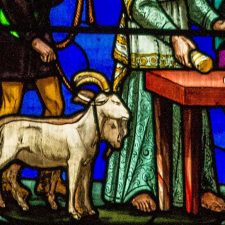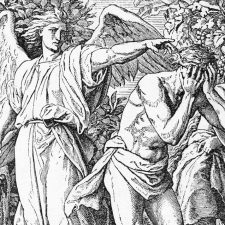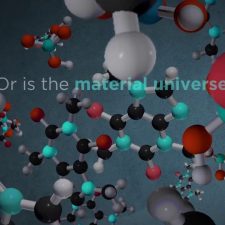Recently, during an exchange on social media, I encountered a question that is often asked when discussing the divine nature of God: “Why would a loving God condemn morally good people to eternal punishment in hell?” It was obvious from the context that the morally good people were not Christians. This question is not new, yet it resonates deeply in a world where notions of justice and morality are interpreted through the lens of modern thought.
The question seems to reduce God’s attributes to His loving nature. God is love they say, as they impress into this nature a requirement for Him to love His created beings unconditionally. After all, John 3:16 says, “For God so loved the world”. Wouldn’t this loving God want to gather all humans, who are made in His image, into heaven after they pass from this life? To do otherwise would not be what a loving God would do.
Or is it? This conversation serves as a relevant backdrop for a broader conversation about the nature of God—a theme central to Christian theology. Our understanding of God is in err if we focus too narrowly on His love, inadvertently neglecting His other attributes. A comprehensive understanding of God requires acknowledging all of His attributes embodied in His character. This includes His justice, righteousness, and sovereignty, which are as integral to His nature as His love and mercy.
Let’s delve into a study of the attributes of God as they harmonious coexistence within His character, particularly as they relate to the concept of eternal judgment. It’s crucial to recognize that God’s actions are not limited to human interpretations of goodness but are deeply rooted in His whole character. This article aims to shed light on this intricate intersection of God’s love, justice, and sovereignty, guiding us through a theological understanding of why a good God would permit humans to be eternally separation from Himself.
The Multifaceted Nature of God
Understanding God in Christian theology requires recognizing His nature as a blend of diverse yet harmonious attributes each of which is equal and perfect in their own way. The Bible offers a profound insight into these attributes, revealing a God who is both complex and coherent in His character.
God’s eternal nature is foundational, as Psalm 90:2 articulates His existence is from everlasting to everlasting. This concept of infinitude frames our understanding of God’s other attributes.
Holiness is another key attribute, setting God apart as supremely pure and distinct from creation. Isaiah 6:3 vividly describes this holiness, highlighting God’s transcendence. All He is and all He does is holy.
Omnipotence, omniscience, and omnipresence are also central to God’s nature. His omnipotence is evident in Jeremiah 32:17, which acknowledges His supreme power. Psalm 139:1-4 reflects His omniscience, revealing a deep, personal knowledge of individuals. Jeremiah 23:24 asserts God’s omnipresence, declaring His universal presence.
God’s attribute of love is well known and often cited, but just as important is His attribute of justice. While these two sound like opposites and seem to be in conflict they are in fact expressions of His singular, unified nature. They exist in harmony and complement each other. The scripture 1 John 4:8 describes God as embodying love, a fundamental aspect that defines His relationship with humanity. This divine love, however, is not separate from His sense of justice. As shown in Romans 2:5-6, God’s judgment is rooted in righteousness, ensuring that His love does not negate the need for justice.
This unity of love and justice in God’s character is crucial to understanding His actions and decisions. His love offers grace and mercy, inviting humanity into a relationship with Him. Yet, His justice upholds moral order, addressing sin and wrongdoing. Both attributes stem from the same divine essence, demonstrating that God’s love is just and His justice is loving. They exist in harmony with all of God’s attributes.
Arthur W. Pink, in “The Attributes of God,” underscores this harmony of attributes. He suggests that understanding God’s character requires seeing His attributes not as contradictory but as complementary. Pink’s perspective helps us appreciate how attributes like sovereignty, love, and justice can coexist without conflict.
Each attribute of God complements and enriches the others, offering a comprehensive picture of a God who is loving, just, sovereign, righteous, merciful and much more. This holistic understanding is pivotal for grasping complex issues such as eternal judgment.
The Concept of Justice and Holiness in God’s Nature
The holiness of God is a fundamental aspect of His nature, which has a profound impact on the relationship between Him and humanity. In the Bible, God’s holiness is highlighted as a fundamental attribute, as seen in Leviticus 19:2, where God commands His people, “Be holy because I, the LORD your God, am holy.” This holiness is not merely moral purity but a distinct otherness that sets God apart from all creation. It is this holiness that illuminates human sinfulness and imperfection, as depicted in Isaiah 6:5, where the prophet Isaiah, confronted with God’s holiness (Isaiah 6:3), becomes acutely aware of his own sin and the sin of his people.
Isaiah 6:5: “Woe to me!” I cried. “I am ruined! For I am a man of unclean lips, and I live among a people of unclean lips, and my eyes have seen the King, the Lord Almighty.”
The implications of God’s holiness for human sin and righteousness are significant. Since God is holy, He cannot tolerate sin, a theme echoed throughout Scripture. Habakkuk 1:13 states, “Your eyes are too pure to look on evil; you cannot tolerate wrongdoing.”
This intolerance towards sin is not a result of vindictiveness but stems from God’s inherent holiness. Mixing one with the other is not possible. Holiness simply cannot abide sin. Therefore, human sin and unrighteousness stand in stark contrast to God’s holy nature, creating a fundamental divide between humanity and God.
God’s justice, intrinsically linked to His holiness, necessitates a response to sin and unrighteousness. In Romans 6:23, it is declared: “For the wages of sin is death, but the gift of God is eternal life in Christ Jesus our Lord.”
Paul has encapsulated the justice of God here—a justice that requires the consequences of sin to be addressed. Divine justice ensures that unrighteousness does not go unpunished, as emphasized in Romans 2:8, which states, “But for those who are self-seeking and who reject the truth and follow evil, there will be wrath and anger.”
The holiness and justice of God are central to understanding His nature and His dealings with humanity. While His holiness reveals the chasm sin created between humans and God, His justice provides a means for bridging that gap as we will explorer shortly.
The Human Condition and the Illusion of Moral Goodness
The concept of total depravity of man in theology paints a vivid picture of the human condition. It says that every aspect of human nature is tainted by sin. As a result, it is impossible for individuals to achieve true goodness on their own. Even what appears as moral living when done outside of God is futilely depraved. We can see this idea explained in Jeremiah 17:9, which states, “The heart is deceitful above all things and beyond cure. Who can understand it?” Here we have the inherent corruption within human nature, underscoring the inability to attain righteousness independently of divine intervention.
Romans 3:23 further expounds on this theme: “For all have sinned and fall short of the glory of God.”
The Apostle Paul asserts that every person is a sinner and thus incapable of meeting God’s standard of holiness on their own. This universal sinfulness separates humans from God, making divine intervention essential for redemption and moral goodness.
The Bible also addresses the issue of self-righteousness, which is often mistaken for true righteousness. In a civilized society we would call this moral and upright living. Not cheating on taxes, following the rules and treating people fairly. Isaiah 64:6 sets this thinking on end where it states: “All our righteous acts are like filthy rags.”
This powerful metaphor illustrates the inadequacy of human efforts at achieving righteousness. The phrase “filthy rags” implies that even the best moral actions of humans are tainted by sin and fall short of God’s standards.
In the New Testament, the parable of the Pharisee and the tax collector in Luke 18:9-14 provides a clear contrast between self-righteousness and humility before God. The Pharisee boasts about his own righteous deeds, while the tax collector humbly acknowledges his sinfulness. Jesus commends the tax collector’s attitude, teaching that self-righteousness is not only inadequate but also objectionable in God’s eyes.
The apostle Paul’s own transformation, detailed in Philippians 3:4-9, further illustrates this point. Paul initially prided himself on his righteousness under the law, yet he later regarded these as worthless compared to the righteousness gained through faith in Christ. This shift highlights the distinction between human righteousness, which is inherently flawed, and divine righteousness, which is perfect and attainable only through faith in Jesus Christ and doing His will.
The human condition is characterized by total depravity. Even when we think we are doing good it is tainted by our sinfulness. Personal, moral goodness is an illusion. There is no good in humanity which underscores the need for divine intervention for true righteousness. Biblical teachings consistently reveal that human attempts at self-righteousness are insufficient and emphasize the necessity of God’s grace for genuine moral and spiritual transformation.
The Finality of Divine Judgment and the Role of Free Will
The concept of free will in theology is pivotal in understanding the nature of divine judgment. Free will allows individuals to make choices, including the ultimate decision to accept or reject God. This freedom, however, carries profound eternal consequences. In Deuteronomy 30:19, Moses is speaking to the people as he commends them to follow God.
“This day I call the heavens and the earth as witnesses against you that I have set before you life and death, blessings and curses. Now choose life, so that you and your children may live.”
Moses tells the people that God sets before them life and death, blessings and curses, urging them to choose life. God urges us to choose life also. This choice obviously implies a voluntary decision to follow God or to turn away, each with its own set of eternal outcomes.
The New Testament continues this theme, particularly in the teachings of Jesus. In John 3:16-18, Jesus speaks of belief in Him as the path to eternal life, while unbelief leads to condemnation.
“For God so loved the world that he gave his one and only Son, that whoever believes in him shall not perish but have eternal life. For God did not send his Son into the world to condemn the world, but to save the world through him. Whoever believes in him is not condemned, but whoever does not believe stands condemned already because they have not believed in the name of God’s one and only Son.”
These verses underscore the role of individual choice in determining one’s eternal destiny. The decision to accept or reject Christ is not merely a temporal one; it bears eternal significance, leading to either salvation or condemnation in this life and the life to come. Here is the thing—once the last breath is drawn the lot becomes set. There are no more opportunities for changing your mind.
The irrevocability of divine judgment post-death is a consistent theme in the teachings of Paul. Hebrews 9:27 states: “Just as people are destined to die once, and after that to face judgment.” We see here clearly the finality of God’s judgment following death. There is no second chance or opportunity for reconsideration once this judgment has been passed. For this reason, there is emphasis on the urgency and seriousness of making a decision about Christ in this lifetime.
The role of free will in theology is integral in understanding divine judgment. It underscores the responsibility and consequence of human choices in relation to God, His holiness and justice. Free will requires the person exercising it to make a conscious decision to embrace Christ and the message of His salvation or to ignore or reject it.
The Necessity of Christ’s Sacrifice and Grace
Christ’s sacrifice as a core tenet of theology cannot be overstated. This sacrifice represents the confluence of divine justice and mercy. According to Romans 3:23-25, all have sinned and fall short of God’s glory, but are justified freely by His grace through the redemption that came by Christ Jesus. This passage highlights how Jesus’ death on the cross was a demonstration of God’s justice, as it satisfied the need for punishment of sin for all of mankind, and of His mercy, as it offered forgiveness and reconciliation of mankind to God.
The significance of Christ’s sacrifice is further emphasized in 1 Peter 2:24, where it is states: “He himself bore our sins in his body on the cross, so that we might die to sins and live for righteousness; by his wounds you have been healed.” Presented here is the incomparable truth that Jesus bore the consequences of sin, offering a path to righteousness that is unattainable through any human effort. It underscores the necessity of the cross as the means by which God’s justice and mercy are made manifest.
Paul is clear in his writings that we cannot save ourselves regardless of what kinds of good things we do. He says that salvation through works is a dead end rather it is a salvation by grace through faith in Christ which saves. Ephesians 2:8-9 declares: “For it is by grace you have been saved, through faith—and this is not from yourselves, it is the gift of God—not by works, so that no one can boast.”
This foundational principle distinguishes Christianity from other belief systems that advocate earning divine favor through human effort. It asserts that salvation is a free gift from God, accessible not through human merit but through faith in Jesus Christ alone.
This doctrine of grace over works is further reinforced in Titus 3:5, which states that God saved us, not because of righteous things we had done, but because of his mercy. This mercy is accessed through the washing of rebirth and renewal by the Holy Spirit, again emphasizing that it is not human works but divine grace that brings salvation.
We are required to trust through faith to attain this salvation. This means that it is incumbent upon the person to choose to embrace salvation. It might be a free gift, but if the gift is not accepted and unwrapped it has no effect on the person receiving it.
Conclusion
We have come full circle now as we ask the question again:
How can a good God condemn people to Hell?
We have established the attributes of God, and it is certain that one of those attributes is His goodness. His goodness is just one of many of His attributes such as holiness, justice, love, and sovereignty. These attributes define the character of God and as such do not exist in isolation but in perfect harmony within His person. Holiness and goodness define the absolute perfection of God. His holiness cannot abide unholiness.
The human condition, because of the fall of man in the Garden, is marked by total depravity. We are completely and totally unable to achieve any righteousness on our own. Our sinful nature results in our corruption and unholiness. Even when attempting to do good, self-righteousness is found to be inadequate to cover the stains of sin. The Bible, from Old Testament to New Testament, consistently points to this truth, emphasizing our need for a savior.
God knew this from before the foundation of the world was laid (Rev 13:8) and formulated a rescue plan for mankind. He would send His own son to live the perfect life we could not live (fulfilling the law) pay the price we could not pay. God sacrificed His own Son on a cross so that we could be reconciled to Him. Jesus rose again on the third day as death could not hold the living and true God. Those who trust in him through faith will be adopted into His household and made children of the living God!
So, what about those who are just really good? Do you really have to trust in God? Can’t you just live a wholesome and upright life and in the end God will say, “Well, look at you. You did great! Come on into Heaven.”?
The answer is NO. Sorry, it does not work that way.
“So, you are telling me God is just going to let all those people who were really good and fed the poor and helped the sick and gave to United Way go to Hell?” you ask.
Yes, that is what a just God must do. Remember, He is just and holy and unless you have wrapped yourself in the blood of Jesus and claimed redemption through trust and faith then you are unholy, and a just God cannot accept you.
This is what Jesus said about those who are headed to Hell and those who will be saved in Matthew 7:13-14:
“Enter through the narrow gate. For wide is the gate and broad is the road that leads to destruction, and many enter through it. But small is the gate and narrow the road that leads to life, and only a few find it.”
If you do not enter through the narrow gate you are bound for destruction. God lets us choose. That is the purpose of free will. He will honor our choice. Either way the finality of divine judgment is just that—final. The eternal implications of our choices and the inescapable nature of God’s judgment post-death are inseparable.
In grappling with the complex issue of eternal judgment, it is crucial to understand the full character of God. A one-dimensional view of God as only loving or only just does not suffice. Instead, we must recognize the depth and breadth of His nature. Understanding God’s holiness, justice, love, and sovereignty in their entirety provides a more comprehensive perspective on why a good God allows eternal separation from Himself.
References and further reading:
Tozer, A. W. (1961). The Knowledge of the Holy.
Sproul, R. C. (1985) The Holiness of God.
Packer, J. I. (1973) Knowing God.
Pink, A. W. (2006). The Attributes of God.
Lewis, C. S. (1952) Mere Christianity.
I am Brad Moore. I live in Kentucky USA with my wife. We have three grown kids and are anxiously awaiting news that a grand might be on the way… I have been a Christian most of my life, coming to Christ at 5. I struggled with a serious misunderstanding of salvation through my young teens feeling that I was a complete failure for God and praying for salvation over and over. Around 17 I learned the marvelous truth of Christ’s saving work. All I needed was faith to trust and He did the rest! Amen. I was baptized in the Snoqualmie River in Washington state at 17. Today I am a Sunday School teacher, Deacon and a Gideon. I love to teach and write about what God has done and will do.
Note: I offered this article to https://levaire.com/ as a guest post on 11/16/2023.













